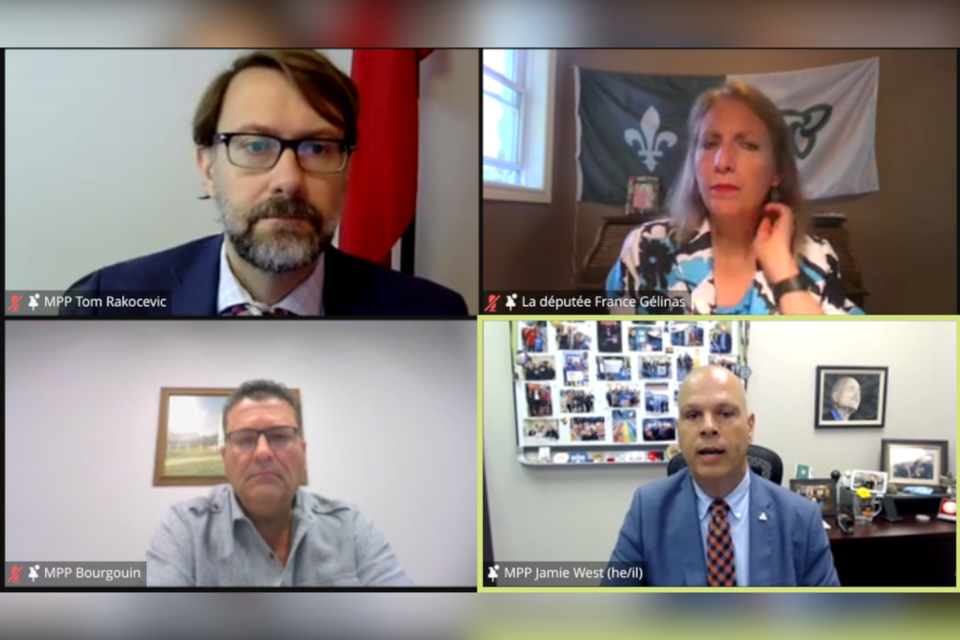The province’s goal to bring high-speed internet access to every community across the province by the end of 2025 will not come to pass.
This, according to a group of NDP MPPs who gathered online alongside experts and municipal leaders to collect virtual testimonials by Zoom on Monday.
“The idea moving forward is really to convince the government before 2025 that they’re not going to meet their deadline in Northern Ontario,” Nickel Belt MPP France Gélinas told Sudbury.com during a media scrum that followed the meeting.
“Things have to change, and there’s knowledge and skills in Northern Ontario that need to be tapped into.”
During her remarks, Marie-Josée Filo from the Timmins-based North Eastern Ontario Communications Network offered similar pessimism regarding the province’s 2025 goal, offering it “will likely not be achievable in Northern Ontario” due to delays, geography and insufficient planning.
“Part of the problem with Northeastern Ontario is that we have a very vast geographic landscape with a low population density,” she said. “Our geography and low population density is not as lucrative to the larger ISPs (internet-service providers), and occasionally these smaller ISPs.”
The government typically hires consultants with little understanding of Northern Ontario’s unique geography, and infrastructure projects in Northern Ontario are not being bid on.
“When it comes to planning and mapping, the target points are usually a little off,” she said.
As several speakers pointed out, cell phone dead zones can cause safety concerns, with Opasatika Township Mayor Jacques Dorval noting that school bus operators often have nowhere to call.
On Highway 11, a lack of communication network can become particularly problematic in the wake of motor vehicle incidents.
“The lack of cell service, and the safety aspect of it for communities ... is something that southern people don’t realize,” he said. “It’s a big problem, because we have road closures, even now we have almost the same amount as during the summer as the winter.”
When people are stuck on the road for several hours, they have no way to reach their families to let them know they’re OK, Dorval said, adding that firefighters face similar communication issues.
“It’s a terrible problem in 2023 that we have those problems on road and Highway 11, on the major highway in the north.”
With internet access, he noted that many kids were stuck at home during COVID-19 school closures, with no cell phones or internet access to attend school virtually.
“We’ve got a problem,” he said.
French River Mayor Gisèle Pageau noted that limited internet access and cell service has stymied economic development in the area, with many developers requiring ample services.
Christine Bedard, chair of Gogama’s Chamber of Commerce, said that internet and cell phone service is out of reach for many people, with her cell phone costing $175 and internet coming in at more than $90 per month.
Fort Albany First Nation Chief Elizabeth Kataquapit said that while internet service in her community has improved lately, there is still no cell service.
Rather than rely on the duopoly of Rogers/Bell, Jesse Fiddler of K-Net argued for public ownership of telecommunications infrastructure.
Likening the telecommunications network to a highway, he said,
“If all the highways were owned by FedEx, what kind of competition would that have?”
Monday’s meeting was one in a handful taking place virtually, at which different segments of the public will be brought together alongside elected officials to map out their vision for the future of telecommunications. The end result will be a piece of legislation the NDP plans on tabling at Queen’s Park.
“We won’t pre-suppose all the answers, but we’ve definitely seen a pattern as we move forward with this consultation,”
NDP Humber-Black Creek MPP Tom Rakocevic said, pointing to assisting public ownership of telecommunications and advocating on behalf of the province with the CRTC has key points.
“Ontarians pay some of the highest internet and cellular rates on earth,” Rakocevic said in a follow-up media release.
“Access to reliable phone and internet services is not a luxury but a necessity of modern life. Together we are looking for solutions that will make life more affordable for all Ontarians.”
Additional hearings and consultations will take place throughout the summer and into the fall. New dates will be announced at tomrakocevicmpp.ca/telecom.
Tyler Clarke covers city hall and political affairs for Sudbury.com.




